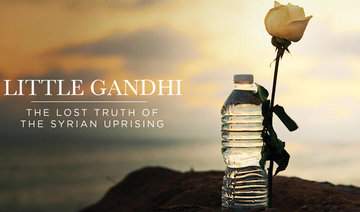BEIRUT: Filmmaker Nigol Bezjian premiered his latest movie “Broken Dinners, Postponed Kisses” with an intimate screening in Beirut on Wednesday night.
The 93-minute film — which features dialogue in Arabic, Armenian, German and English with English-language subtitles — follows six Syrian artists as they narrate their stories of displacement.
Bezjian, an Armenian born in Aleppo, Syria, spoke to Arab News about the experience of making the powerful film and said it was inspired by one of his previous works, “Thank You, Ladies and Gentlemen.”
“The movie is about Syrian refugees in the camps of Lebanon and it stayed with me,” he said about his previous film. “But I wanted to make a film about people in our region who had to depart their homeland, from the time of the end of World War I until today.”
That sparked the idea for his latest venture.
Bezjian chose six characters and honed in on their past experiences in what turned out to be an insightful peek through the keyhole into the lives of those who have been affected by the strife in Syria.
“The characters in the film are artists who work in different disciplines of art,” he explained.
“The film is something of a documentary, as the characters’ stories are all real, yet the concept that ties them all together was created by me,” the filmmaker continued.
Making an appearance are filmmaker Vartan Meguerditchian, actor Ayham Majid Agha, musician Abo Gabi, dancer Yara Al-Hasbani, painter Diala Brisly and photographer Ammar Abd Rabbo.
The film explores the inner feelings and reflections of people who had to leave their homes and be transported to a new environment, facing many challenges along the way.
Despite the sometimes heart-wrenching subject matter, Bezjian noted that the main challenges he faced while producing the film were budget and timeframe.
“The movie took two-and-a-half years (to make), so the main challenge was not to give up and keep the same spirit and momentum throughout this time,” he said.
At the screening, an eager crowd listened as the filmmaker gave his introductory speech.
“There are a lot of faces I don’t recognize, and that’s a good thing,” Nigol said.
The movie is filled with tense moments, artistic shots and captivating characters, that succeeded to show the reality of artists’ lives in environments marked by conflict and refuge.
































